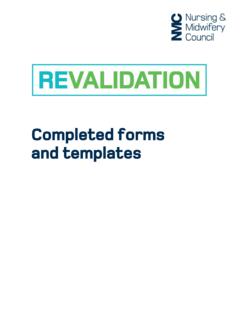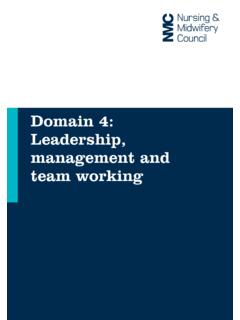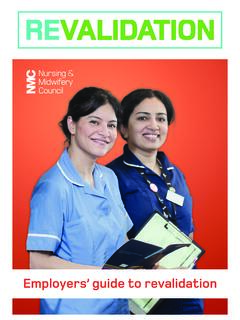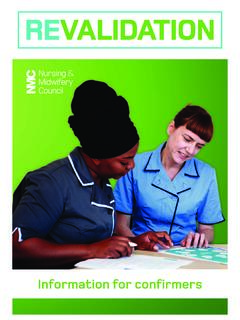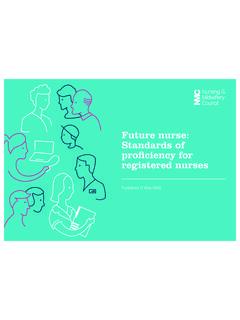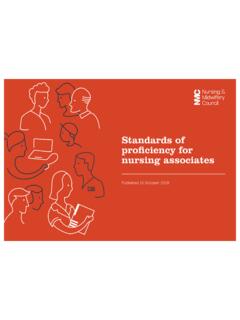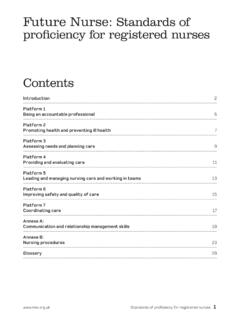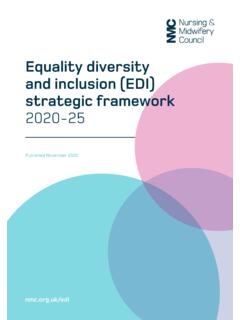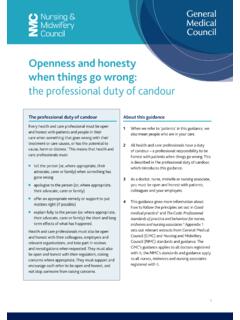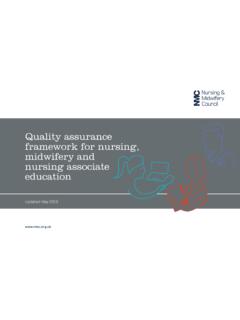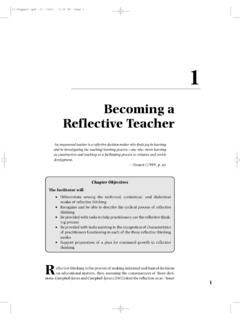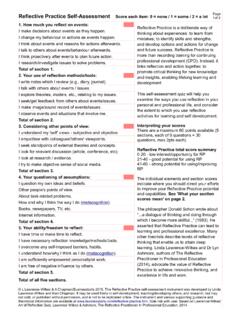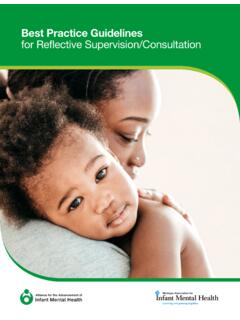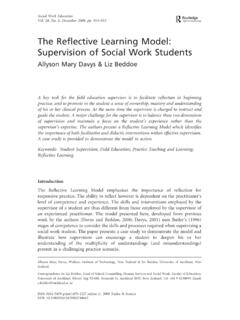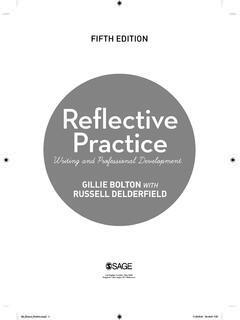Transcription of Benefits of becoming a reflective practitioner
1 Benefits of becoming a reflective practitioner A joint statement of support from Chief Executives of statutory regulators of health and care professionals This joint statement sets out our common expectations for health and care professionals to be reflective practitioners, engaging meaningfully in reflection and the Benefits it brings. Being a reflective practitioner Benefits people using health and care services by: Supporting individual professionals in multi-disciplinary team work. Fostering improvements in practice and services. Assuring the public that health and care professionals are continuously learning and seeking to improve. As well as expecting the people we regulate to be reflective practitioners, we also have a duty to consider our own actions, and their effect. We are committed to improving how we provide assurance and protection to the public. We do this continuously in our work, through evaluation, to reflect and make changes in what we do and how we work. This statement reflects the principles set out in each regulator s individual code of practice, professional standards or guidance on reflective practice.
2 Being a reflective practitioner Reflection is the thought process where individuals consider their experiences to gain insights about their whole practice. Reflection supports individuals to continually improve the way they work or the quality of care they give to people. It is a familiar, continuous and routine part of the work of health and care professionals. Opportunities for multi-professional teams to reflect and discuss openly and honestly what has happened when things go wrong should be encouraged. These valuable reflective experiences help to build resilience, improve wellbeing and deepen professional commitment.* Our common expectations for reflective practitioners Engaging in reflection Benefits health and care professionals and the multi-professional teams in which they work, or with whom they might discuss aspects of their practice. Key considerations include: * 2 Demonstrating reflection is part of the information we require for continued registration through our revalidation, continuing professional development or continuing education requirements.
3 Ensuring patient confidentiality is vital. Where reflections are recorded, they should be anonymised and focus on learning gain and development rather than the identifiable details of people, the experience, activity or event. We will not ask those who are on our registers to provide their personal written reflections in order to investigate a concern about them. Registrants can choose to offer them as evidence of insight into their practice. How reflection can be more effective We want to encourage health and care professionals, and their employers, to gain the maximum benefit from investing time and effort in reflection. Components of good reflection often include: Professionals who proactively and willingly engage in the practice making it less of a tick box exercise. A systematic and structured approach that aims to draw out learning outcomes has a greater impact. There are many good models of reflective practice and methods that can be used to drive reflection. For example, there may be regular activities that support a team to reflect on their practice, such as debriefs or case reviews.
4 For other health and care professionals, their context of practice may mean that they reflect individually and without an organisational activity to support it. Both positive and negative experiences. Any experience, including a conversation with a colleague, a significant clinical or professional event, or a period of time can generate meaningful reflections, insights and learning. Involves people who use services, patients, their families and carers in the reflective process, helping professionals to focus on what matters to people using health and social care services. Building multi-professional teams of reflective practitioners Reflecting in groups, teams and multi-professional settings is an excellent way to help develop ideas or actions that can improve practice. 3 Learning with others builds a collective wisdom through discussion, support and knowledge sharing. Working and learning together increases the likelihood that meaningful and positive change will happen.
5 * Care for individuals and service delivery improves when teams and groups are given opportunities to explore and reflect on their work together. These interactions often lead to ideas or actions that improve care. While reflection is personal, it is often informed by the professional standards and duties expected by the different professions and their regulators. When individuals, in multi-professional teams, reflect together, they should be sensitive to, and respect, the different modes of reflections of their colleagues. In many cases, there are formal and informal power dynamics that may limit the value and positive power of reflection unless facilitated carefully and respectfully all views need to be respected and listened to. Outputs from team reflective activities may include suggestions or plans to improve care or the service provided. Activities, like case-based discussions, can provide a safe outlet to explore thoughts and feelings triggered by different experiences.
6 Annex Each regulator s requirements for reflection Professional Regulator Approach to reflection General Chiropractic Council We encourage registrants to be reflective practitioners through the CPD scheme. The GCC is not prescriptive with the type of activity that registrants must complete for their CPD, however, chiropractors must design learning cycles that require them to reflect on their practice in order to assess their learning needs and subsequently reflect on and evaluate the effectiveness of the CPD activities. The CPD scheme is also designed to promote learning with others. General Dental Council We introduce reflection through the Enhanced CPD scheme, and encourage dental professionals to reflect * Tony Ghaye. (2007) Building the reflective Healthcare Organisation. Wiley-Blackwell. 4 on the outcomes of their CPD activity, focussing on what they have learned and how this influences their daily practice and duties. The GDC is not prescriptive with how professionals should reflect or record reflection - professionals should reflect in the way that suits them best.
7 General Medical Council Group reflection activities should be encouraged by employers and training providers as they provide mechanisms to identify complex issues and effect change across systems. Time should be made available, both for self-reflection, and to reflect in groups. General Optical Council Reflection is currently part of the GOC s enhanced CET scheme and there are a number of tools registrants can use to reflect on their practice. At the beginning of each CET cycle, registrants are asked to complete a scope of practice questionnaire to help identify learning and development. Registrants are expected to complete a personal development plan for each three year CET cycle, which they should use to reflect on their practice, plan their CET and review how well it went. Registrants must complete a reflective statement when they attend a peer review event or a peer discussion to capture their learning. Registrants can voluntarily reflect on their practice at any point and add a reflective statement on the CET system.
8 We are currently reviewing our CET scheme with the aim of further embedding and instilling the concept of reflection. 5 General Osteopathic Council Reflection is an intrinsic element of the CPD requirement for osteopaths. They are required to record CPD activities and the relevance and impact of these on practice. Many osteopaths work in sole practice. The CPD scheme encourages engagement with other professionals treating patients. For example, osteopaths can seek objective feedback on practice through the input of another osteopath or healthcare professional. The three-year CPD cycle culminates in a peer discussion review, which is a structured conversation with another osteopath or registered healthcare professional in which the osteopath demonstrates how they have engaged with CPD the scheme. General Pharmaceutical Council Reflection is a core part of our model. We encourage pharmacy professionals to reflect with others through their peer discussion. Registrants choose their peers and may choose to reflect as part of a group, including a multi-disciplinary group.
9 Health and Care Professions Council We take a flexible, outcome based approach to CPD and therefore do not specify the types of activities registrants must include in their CPD profiles. However, our CPD guidance encourages registrants to learn and reflect on their practice. In particular, we reference developing evidence that suggests that the most effective learning activities are often those that are interactive and which encourage self-reflection . Nursing and Midwifery Council We encourage nurses, nursing associates and midwives to engage in reflective practice and encourage a culture of sharing, reflection and 6 improvement; ensuring nurses, nursing associates and midwives do not practise in professional isolation. Pharmaceutical Society NI We encourage Pharmacists to reflect on their practice and require them to record this as part of their mandatory annual CPD submission. This is further articulated in Principle 5 of our Code.
